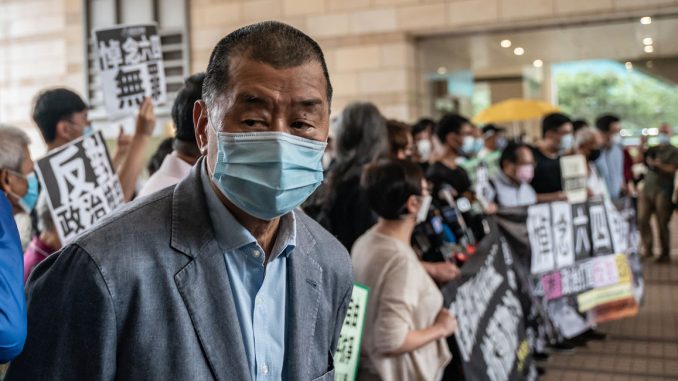
This week, while we celebrate the work of America’s Founders, I honor a living freedom fighter: billionaire businessman Jimmy Lai.
When Communist China crushed freedom in Hong Kong, Lai could have gone anywhere in the world and lived a life of luxury. But he chose to stay in Hong Kong and go to jail.
A new documentary, “The Hong Konger,” tells his story.
Lai grew up in poverty in China.
“My mother was [imprisoned] in a labor camp,” he recalls. “We were just 5 or 6 and managing ourselves without an adult in the household. When I was 8 and 9, I worked in the railway station carrying people’s baggage.”
There he learned about a little British-controlled island near China called Hong Kong, where people were less poor. So he went there “in the bottom of a fishing junk, together with maybe 100, maybe 80, people, and everybody vomiting.”
Once in Hong Kong, he was amazed at how plentiful food was. “I never saw so many things for breakfast. I was so moved. I was crying.”
He got a job in a sweatshop. “We had to wake up before 7 and worked until 10 p.m. But it was a very happy time … a time that I know I had a future.”
The chance to have a future makes such a difference.
At the time, Hong Kong was an unusually free country. Police enforced law and order, but otherwise, the British rulers left people alone. That allowed people to prosper.
“The British gave us the institutions of freedom,” says Lai. “Rule of law, free speech, the free market … That created the best in the world. That was very enlightening for me.”
Lai eventually saved enough money to start a clothing business. “I started a very small factory. Eventually we became one of the biggest sweater factories in Hong Kong.”
Gradually, his clothing business, Giordano, made him rich.
Lai assumed that the Communist Chinese, seeing the prosperity in Hong Kong, would leave the island alone. After all, even the communists were embracing some capitalism.
“I thought China is going to be changed,” says Lai. “China is going to be like Western country that I’ve been to. I was very excited.”
But then came the Tiananmen Square massacre. That inspired Lai to start a media company. Media are important, he said, because they deliver information, “which is choice, and choice is freedom.”
Lai’s media business thrived. He covered Chinese government abuses when other Hong Kong media wouldn’t. “Everybody was so chickened out, so scared. They went into self-censorship to avoid offending the communists.”
Even foreign investors kept quiet to protect their investments in China.
Then, in 2020, China passed a “national security” law that declared it illegal for Hong Kongers to criticize the Chinese government.
“It became impossible for media to survive!” complained Lai. “Whatever we say can be sedition.”
A conviction for sedition would mean jail time, three years to life.
But Lai kept his paper open.
“If we just surrender,” he said, “we will lose the rule of law. Lose the freedom. We will lose everything.”
Hong Kong did lose its freedom, but Lai still refused to leave. “I came here without anything. … I owe freedom my life. … Don’t think about the consequences. Do what is right.”
For publishing the truth about the communist government, Lai was arrested and sentenced to five years in jail. Chinese officials say they may add more years.
Still, Lai says he doesn’t regret his decision to stay.
“It would be so boring just being a businessman. I want to make my life more meaningful and interesting. That’s why I got into the trouble I got into today. And I’m happy to have it.”
Happy?
Jimmy Lai is a remarkable man, and a hero of freedom.
You can watch the whole documentary about him at FreeJimmyLai.com.
COPYRIGHT 2023 BY JFS PRODUCTIONS INC.
The Daily Signal publishes a variety of perspectives. Nothing written here is to be construed as representing the views of The Heritage Foundation.
Have an opinion about this article? To sound off, please email letters@DailySignal.com and we’ll consider publishing your edited remarks in our regular “We Hear You” feature. Remember to include the url or headline of the article plus your name and town and/or state.

